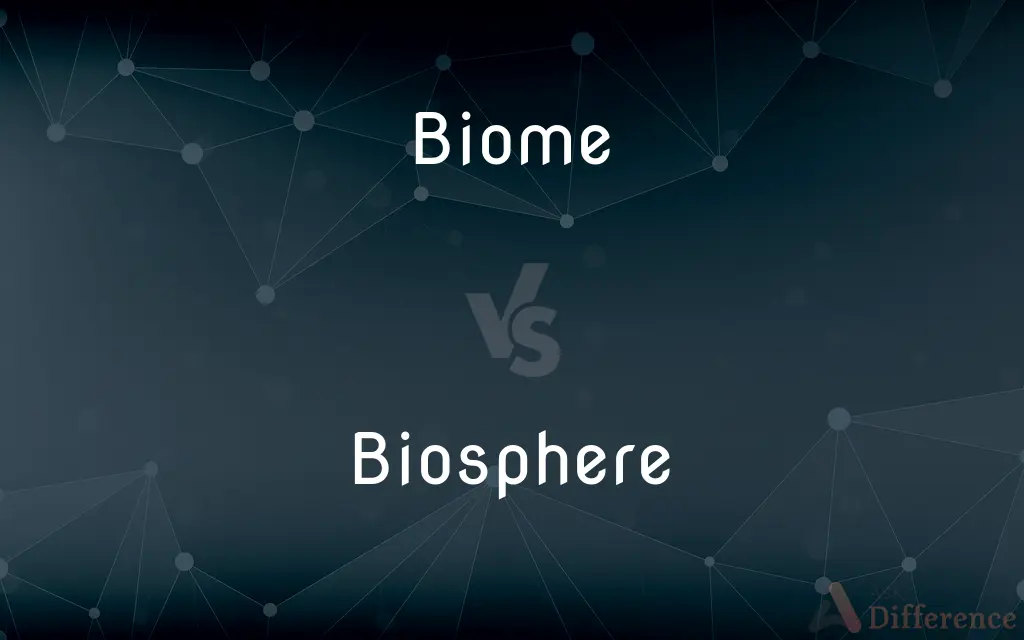Biome vs. Biosphere — What's the Difference?
By Tayyaba Rehman — Updated on October 28, 2023
Biome refers to a large ecological area with distinct flora, fauna, and climate, while biosphere encompasses all life and ecosystems on Earth.

Difference Between Biome and Biosphere
Table of Contents
ADVERTISEMENT
Key Differences
Biome is a term that signifies large geographical areas characterized by specific plant and animal life adapted to its climate and conditions. Biosphere, on the other hand, is a broader concept that includes all the biomes and encompasses the entire living component of Earth.
In a biome, the focus is on the interaction between organisms and their environment within a specific climate zone. The biosphere, however, deals with the global ecological system integrating all living beings and their relationships, including their interaction with elements of the lithosphere, hydrosphere, and atmosphere.
There are various types of biomes, such as rainforests, deserts, and tundras, each with unique characteristics. The biosphere, conversely, is singular and represents the sum of all ecosystems and life forms on the planet.
While a biome is an important ecological concept for understanding regional ecological dynamics, the biosphere is crucial for understanding global ecological processes, such as climate change and biodiversity. The study of biomes often provides insights into conservation strategies, whereas the study of the biosphere involves understanding the Earth’s life support systems.
Biome research often focuses on regional conservation and ecological balance, while biosphere studies emphasize global ecological health and sustainability. For instance, protecting a particular biome like the Amazon rainforest versus understanding the impact of human activities on the entire biosphere.
ADVERTISEMENT
Comparison Chart
Scope
Large geographic area with distinct ecosystems.
Entire planet's life-supporting ecosystems.
Focus
Specific regional ecosystems.
Global ecological system.
Components
Specific flora, fauna, climate.
All living beings, ecosystems.
Variety
Multiple biomes (rainforest, desert, etc.).
Singular concept.
Research Implications
Regional conservation, ecological balance.
Global ecological health, sustainability.
Compare with Definitions
Biome
Region characterized by its climate and life forms.
The tundra biome is marked by cold temperatures and minimal vegetation.
Biosphere
The zone on Earth where life exists.
Human activities have significant impacts on the biosphere.
Biome
A categorization of Earth’s surface based on ecology.
Scientists study the rainforest biome for its biodiversity.
Biosphere
All of Earth’s living organisms and their habitats.
The biosphere is affected by global climate change.
Biome
A segment of Earth with similar environmental features.
The coral reef biome is rich in marine life.
Biosphere
Integration of all living beings and their environments.
Scientists study the biosphere to understand ecological balance.
Biome
A large area with distinct plant and animal life.
The savanna biome is known for its grasslands and diverse wildlife.
Biosphere
Earth's space supporting life.
The biosphere's health is essential for sustaining life on the planet.
Biome
An area providing specific living conditions for its species.
The desert biome is adapted to arid conditions.
Biosphere
The biosphere (from Greek βίος bíos "life" and σφαῖρα sphaira "sphere"), also known as the ecosphere (from Greek οἶκος oîkos "environment" and σφαῖρα), is the worldwide sum of all ecosystems. It can also be termed the zone of life on Earth.
Biome
A biome is a distinct biogeographical unit consisting of a biological community that has formed in response to a shared regional climate. Biomes may span more than one continent.
Biosphere
The part of the earth and its atmosphere in which living organisms exist or that is capable of supporting life.
Biome
A major regional or global biotic community, such as grassland or desert, characterized chiefly by its prevailing climate and vegetation.
Biosphere
The living organisms and their environment composing the biosphere.
Biome
Any major regional biological community such as that of forest or desert.
Biosphere
The part of the Earth and its atmosphere capable of supporting life.
Biome
All the genomes of such a community.
Biosphere
The totality of living organisms and their environment.
Biome
A specific type of complex ecological community characterized by specific environmental conditions and a distinctive group of plants and animals, maintained in a relatively stable equilibrium, such as a rain forest biome or prairie biome.
Biosphere
The regions of the surface and atmosphere of the Earth (or other planet) where living organisms exist
Biome
A particular region which is a biome{1}.
Biosphere
The layer that contains all the planet's life forms.
The biosphere includes everything from deep-sea vents to mountain peaks.
Biome
A major biotic community characterized by the dominant forms of plant life and the prevailing climate
Common Curiosities
Are biomes the same worldwide?
No, they vary based on climate and geography.
Does the biosphere include oceans?
Yes, it includes all life, including marine ecosystems.
Is the biosphere affected by pollution?
Yes, pollution can have global effects on the biosphere.
Are all biomes equally diverse?
No, biodiversity varies among different biomes.
Does the biosphere interact with the atmosphere?
Yes, they interact, especially in the exchange of gases.
Do biomes have specific climates?
Yes, each biome has a characteristic climate.
Is the biosphere the same as the ecosystem?
No, it’s the sum of all ecosystems on Earth.
Can biomes change over time?
Yes, due to climate change and human impact.
Are biomes affected by latitude?
Yes, latitude influences climate and biome type.
Can human activities alter biomes?
Yes, through deforestation, urbanization, etc.
Is the biosphere a closed system?
It's largely closed in terms of matter but open for energy.
Does the biosphere include extinct species?
No, it only includes currently living organisms.
Are biomes important for climate regulation?
Yes, they play a significant role in climate.
Can biosphere studies help in conservation?
Yes, they provide insights for global conservation.
Do biomes contribute to the biosphere's balance?
Yes, each biome plays a role in ecological equilibrium.
Share Your Discovery

Previous Comparison
Verbalise vs. Verbalize
Next Comparison
Highball vs. TumblerAuthor Spotlight
Written by
Tayyaba RehmanTayyaba Rehman is a distinguished writer, currently serving as a primary contributor to askdifference.com. As a researcher in semantics and etymology, Tayyaba's passion for the complexity of languages and their distinctions has found a perfect home on the platform. Tayyaba delves into the intricacies of language, distinguishing between commonly confused words and phrases, thereby providing clarity for readers worldwide.















































